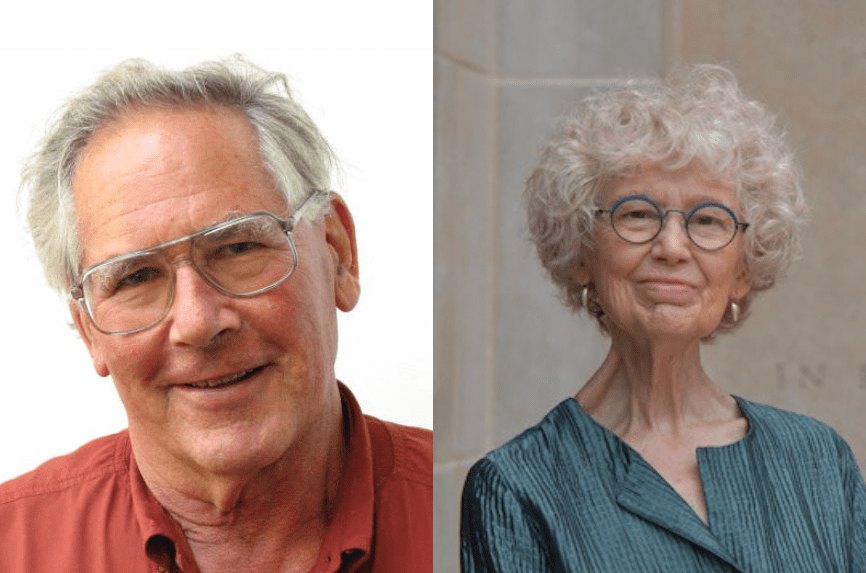Hastings Center News
Hastings Center Recognizes Norman Daniels and Rebecca Dresser with 2023 Bioethics Founders’ Award
Norman Daniels, PhD, the Mary B. Saltonstall Professor of Population Ethics and Professor of Ethics and Population Health, Emeritus at Harvard T.H. Chan School of Public Health, and Rebecca Dresser, JD, the Daniel Noyes Kirby Professor of Law Emerita at Washington University in St. Louis School of Law, have been named recipients of the 2023 Bioethics Founders’ Award.
The Bioethics Founders’ Award, given by The Hastings Center, recognizes individuals from around the world who have made substantial, sustained contributions to bioethics in ways that have advanced thinking and practice in medicine, the life sciences, and public policy.
Hastings Center President Vardit Ravitsky will present the awards at a ceremony on October 13 at the American Society for Bioethics and Humanities (ASBH) annual conference in Baltimore.
Norman Daniels
Dr. Daniels was recognized for pioneering work that has addressed justice in health care. His 50 years of scholarship encompass issues of distributive justice and health policy, philosophy of science, ethics, political and social philosophy, and medical ethics.
Before coming to Harvard, he was Goldthwaite Professor and chair of the philosophy department at Tufts University and professor of medical ethics at Tufts Medical School from 1969 to 2002. He served on the Ethics Working Group of the Clinton White House Health Care Task Force. He is a Hastings Center fellow, a member of the Institute of Medicine, and a founding member of the National Academy of Social Insurance and of the International Society for Equity in Health. He has consulted on issues of justice and health policy for organizations, commissions, and governments, including the United Nations, the World Health Organization, and the U.S. President’s Commission for the Study of Ethical Problems in Medicine.
He is the author or co-author of many books, including: Just Health: Meeting Health Needs Fairly (2007); (with James Sabin) Setting Limits Fairly: Can We Learn to Share Medical Resources? (2008); and Justice and Justification: Reflective Equilibrium in Theory and Practice and Seeking Fair Treatment: From the AIDS Epidemic to National Health Care Reform (1996).
He received his AB from Wesleyan University; BA (MA) from Balliol College, Oxford; and PhD in philosophy from Harvard.
Rebecca Dresser
Dr. Dresser was recognized for work on a wide range of topics in health care and research and ground-breaking writing on living wills and decision-making at the end of life.
In 1983, she began teaching medical and law students about legal and ethical issues in end-of-life care, biomedical research, genetics, assisted reproduction, and related topics. She has been a member of the Washington University in St. Louis faculty since 1998. Before that, she taught at Baylor College of Medicine and Case Western Reserve University.
She is a contributing editor and “At Law” columnist for the Hastings Center Report. The Report published one of her earliest articles, an analysis of self-binding agreements in health care, a topic she has returned to many times in her scholarship. She has also participated in many Hastings Center activities, including projects on ethical issues in animal research, long-term contraception, and research conflicts of interest.
After being diagnosed with and treated for cancer, Dresser brought together a group of bioethics scholars who had also had personal experience with cancer. They worked together to produce Malignant: Medical Ethicists Confront Cancer (2012), which describes how personal experience enriched their understanding of standard medical ethics topics like breaking bad news and treatment decision making, as well as less recognized topics like the ethics of cancer interactions, stereotypes, and survivorship. Dresser adopted a similar approach in her 2017 book, Silent Partners: Human Subjects and Research Ethics, which calls for including experienced study subjects in research ethics deliberations.
Dr. Dresser is also the author of When Science Offers Salvation: Patient Advocacy and Research Ethics (2001) as well as a co-author of The Human Use of Animals (1998 and 2008), and Law and Bioethics (2003). She has written commissioned papers for the National Academy of Sciences and National Bioethics Advisory Commission. From 2002 to 2009, she was a member of the President’s Council on Bioethics and, from 2011 to 2015, she was a member of the National Institutes of Health Recombinant DNA Advisory Committee. She has been a visiting scholar at the University of Tokyo and the National Institutes of Health Bioethics Department. She is a Hastings Center fellow.
She received her BA and MS from Indiana University and JD from Harvard Law School.

